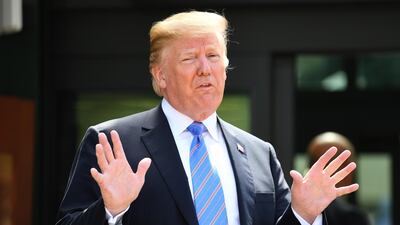The last fortnight has seen a catalogue of risks pile up for financial markets to contend with - from political events in Italy and Spain to global trade tensions and geopolitical uncertainty - on top of the regular ebb and flow of economic data.
Despite these risks the MSCI World index has gained 1.9 per cent over the last month, while the MSCI Emerging Markets index has gained 0.9 per cent, suggesting that the markets are still prepared to take them broadly in their stride, and instead focus on the strength of ongoing economic data. Following the fractious G7 meeting in Canada, the focus in the coming week will be on the summit between President Donald Trump and Kim Jong-un of North Korea in Singapore. The Federal Open Market Committee meeting in the US will also be in the spotlight with markets pricing in a near 100 per cent likelihood of another interest rate hike.
Developments in Europe were the centre of attention just a week ago, but the appointment of government in Italy has managed to calm some investor nerves. While the immediate risk of another election has receded, the populist government of the Five Star Movement and the League looks set to clash with the EU and the European Central Bank if they implement their election promises, including reducing the pensionable age, introducing a ‘citizen’s income’ and cutting taxes.
The markets would be unwise to write-off these political developments quite so quickly. Indeed the ECB has already indicated that it will formally discuss the ending of the quantitative easing programme soon, most likely at the meeting this week, potentially bringing forward the moment it comes into conflict with the Italian government.
Increased trade tensions have also been taken in their stride by markets, more easily than might have been feared, even though the political fallout between the US and its allies appears to be deepening, to say nothing of the gulf between the US and China. Again the markets may be too sanguine about these issues, with any retaliatory action by Europe or China potentially precipitating a damaging trade war.
________
Read more:
A stronger dollar and firmer oil prices threaten capital flows to emerging markets
Abu Dhabi's Dh50bn stimulus will boost economic growth, property market
________
While most consensus estimates of what a trade war might actually imply for GDP growth are relatively minor, the World Bank has said it could take the world economy back to the financial crisis of 2008. Under the scenario outlined in its latest global economic prospects report published last week, the bank found a broad-based increase in the use of import tariffs worldwide would trigger a decline in global trade amounting to 9 per cent.
Trade wars have a nasty habit of damaging the countries that start them the most, and this includes the US, where the agricultural sector is vulnerable to retaliatory measures from China. It may also leave corporates like Apple, which derive significant revenues from Chinese sales, also exposed. Of course, the US is also financially exposed to China, which is the biggest official foreign holder of its Treasuries.
However, markets are currently being mollified by the ongoing strength of economic data, particularly in the US where the economy appears to be firing on all cylinders. US non-farm payrolls beat market expectations in May with 223,000 new jobs added, and with the unemployment rate falling to 3.8 per cent, the lowest since 2000. Average hourly earnings rose 0.3 per cent month-on-month and 2.7 per cent year-on-year, also higher than forecast. Separately, the Institute for Supply Management activity readings also rose by more than expected in May, signaling faster GDP growth in the second quarter.
Overall, it now appears certain that the Fed will push ahead with another 25 basis points rate hike at its meeting later this week, despite increased uncertainty about trade policy and political developments in Europe. The markets appear able to absorb this, but if it is followed by a warning from the ECB that it too will start tightening soon then the reaction may be different.
Of course the focus on monetary policy this week will in part take second place to the political drama unfolding in Singapore where Donald Trump will finally meet North Korea’s Kim Jong-un. And as with the other risks, the key issue will be how much the financial markets will be prepared to take what they see in Singapore at face value, rather than questioning what lies beneath the surface of any Trump-Kim deal.
Tim Fox is group chief economist and head of research at Emirates NBD


